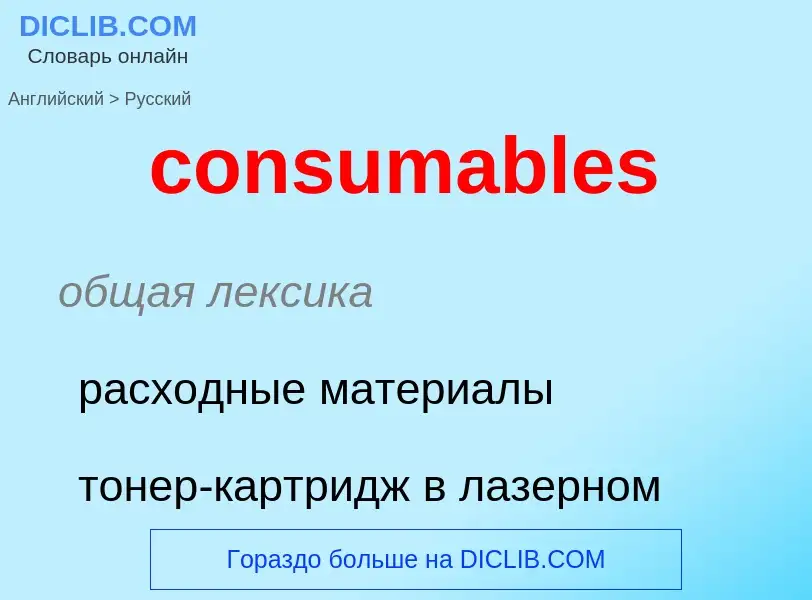Traduction et analyse de mots par intelligence artificielle ChatGPT
Sur cette page, vous pouvez obtenir une analyse détaillée d'un mot ou d'une phrase, réalisée à l'aide de la meilleure technologie d'intelligence artificielle à ce jour:
- comment le mot est utilisé
- fréquence d'utilisation
- il est utilisé plus souvent dans le discours oral ou écrit
- options de traduction de mots
- exemples d'utilisation (plusieurs phrases avec traduction)
- étymologie
consumables - traduction vers russe
[kən'sju:məb(ə)l]
прилагательное
общая лексика
потребляемый
расходуемый
годный к потреблению
могущий быть уничтоженным
истреблённым
потребляемый, расходуемый
существительное
[kən'sju:məb(ə)l]
общая лексика
обыкн. предметы потребления
2) pl потребительские товары
Définition
Wikipédia
Consumables (also known as consumable goods, non-durable goods, or soft goods) are goods that are intended to be consumed. People have, for example, always consumed food and water. Consumables are in contrast to durable goods. Disposable products are a particular, extreme case of consumables, because their end-of-life is reached after a single use.
Consumables are products that consumers use recurrently, i.e., items which "get used up" or discarded. For example consumable office supplies are such products as paper, pens, file folders, Post-it notes, and toner or ink cartridges. This is in contrast to capital goods or durable goods in the office, such as computers, fax machines, and other business machines or office furniture. Sometimes a company sells a durable good at an attractively low price in the hopes that the consumer will then buy the consumables that go with it at a price providing a higher margin. Printers and ink cartridges are an example, as are cameras and film as well as razors and blades, which gave this business model its usual name (the razor and blades model).
Printing Consumables is another term used for office supplies. These are the consumable components like toner cartridges, they are consumed, utilized and then exhausted. These supplies are considered to be a major element of printing process.
For arc welding one uses a consumable electrode. This is an electrode that conducts electricity to the arc but also melts into the weld as a filler metal.
Consumable goods are often excluded from warranty policies, as it is considered that covering them would excessively increase the cost of the premium.

